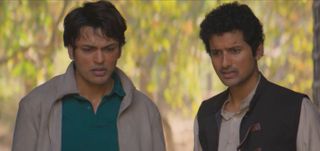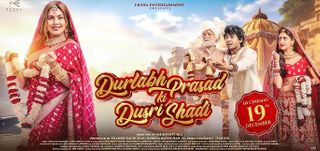Naina Movie Review
Post-"Black", if there was any doubt about Hindi cinema coming of age, here's further proof that our movies aren't going back to the song-and-dance formula in a hurry... at least not in the same way that we once knew.
Let's get down to brass tacks right away. "Naina" has no songs, no dances, no kitsch and none of the formulaic flourishes, which make Hindi cinema so darned hard to digest outside home territory.
In fact this is one of the most cosmopolitan films in the Hindi language. The dialectics and dynamics of the supernatural drama are so liberated of idiosyncratic ideology that we often wonder if debutant director Shripal Morakhia has deliberately steered away from convention, just to be one-up on his kitschy colleagues in Mumbai.
It doesn't take Morakhia long to disabuse us of cynicism. His grip over the narrative is as strong as the spooks who haunt our heroine after her cornea transplant.
Suddenly Naina can see a lot more than she had bargained for. Ripping off a page from Manoj Night Shyamalan's theory of supernatural elements co-existing with the human world, Morakhia weaves a yarn that's bloodcurdling in its spooky ramifications.
Scenes showing Naina connecting with supernatural elements send a chill up our spine. There are scenes showing Naina's premonition of mortality that horrify immensely.
This is a new experience for horror buffs. For once the fear emanates from the heroine's eyes, and not just the camera lens.
Not that C.K. Muraleedharan's cinematography lacks in an inner vision in this film that tells us that seeing is not just about believing. Damn it, seeing isn't about optical vision either! It's about reaching a hand into the other world and touching troubled souls. The writer and director's belief in the idea of spirits is crystallised by the compelling camerawork.
The lenses move through luminous London and crusty Bhuj without making a touristy brouhaha. Stealthily, the drama touches dimensions that move viewers across a terrain of the known and unknown.
The editing by Amitabh Shukla, background music by Salim-Sulaiman and artwork by Muneesh Sappel - who did a great job in the other Urmila starrer "Pinjar" - are seamless. The film's technique never invites attention to itself. Instead, it wins us over through understatement.
London is certainly not a character in the film. It's just the venue for a drama that defies rational explanation and yet compels us to look at itself through the sheer velocity of terror and awe generated in the narration.
The film moves through two dimensions of life and death to create a life of its own. There are no glitches in the plot movement. Morakhia doesn't pause to take a look at his own work. The narrative moves briskly though slowly through complex images of tyrannical terror, creating undulating rhythms of life and after-life, death and restless spooks...
It's hard to imagine this film working without the amazing Urmila. She's the only actress of her generation to be doing such exemplary work. This isn't the first time she has done horror.
In "Naina", Urmila has created a woman who goes from blindness to light and back into darkness, creating dimensions that aren't visible to the naked eye and yet not invisible to those who don't want to look hard.
This is yet another outstanding performance by an actress who is constantly on the prowl for passionate opportunities. Urmila's armoury of expressions, ranging from the terror of the unknown to the fear of the known, gives the film a unique twist.
Anuj Sawhney as the supportive psychiatrist provides able support. But Kamini Khanna as Urmila's grandmother is obtrusively hammy. Her ill-fitting chalky wig could have something to do with it.
The special effects, including a subway explosion in London, are arguably better than anything we've seen in a horror film in India. In fact the layered conviction of the entire product is matched by the director's skilled rendering of a



















